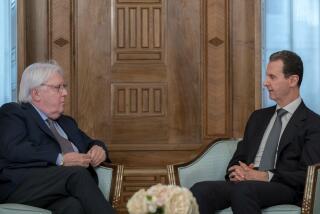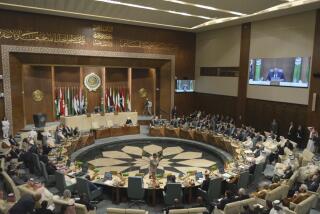Syria and PLO Fail to Resolve Their Quarrel
- Share via
DAMASCUS, Syria — Less than two months after taking steps to patch up their longstanding quarrel, Syria and the Palestine Liberation Organization have failed to make any progress toward a reconciliation.
The failure is significant, according to Western diplomats and Arab officials, because both sides had hoped to attend the Arab summit conference in Algiers next week with an agreed joint strategy on how to support the Palestinian uprising in the Israeli-occupied territories of the West Bank and Gaza Strip.
“The reconciliation is a very slow process, and it’s obviously taking much longer than anyone expected,” a high-ranking Palestinian here said.
Officially, the reconciliation effort began after the assassination in April of the PLO military commander, Khalil Wazir, also known as Abu Jihad. Wazir was gunned down in Tunis, Tunisia, apparently by Israeli commandos.
Wazir was buried in Damascus after a tumultuous funeral attended by high-ranking PLO officials who seized the moment to begin preparing the groundwork for the reconciliation talks.
On April 25, Syrian President Hafez Assad met with PLO Chairman Yasser Arafat, and both sides saluted what they said was a joint effort to support the uprising in the Israeli territories.
The Assad-Arafat meeting was regarded as a major concession by the Syrians, because Assad has long loathed the PLO leader. This hostility led Syria to expel the PLO from Damascus in 1983 and then to support a civil war within the PLO. In December, 1983, Syrian-backed PLO dissidents routed Arafat and his followers in the northern Lebanese city of Tripoli.
In the years since, Syrian surrogates in Lebanon, notably the Shia Muslim militia Amal, have waged a nonstop war against Arafat supporters in Palestinian refugee camps throughout the country.
According to Syrian and Palestinian officials, Syria changed its mind largely because of the continuing Israeli uprising and the clear evidence that many people there are still loyal to Arafat.
While Arafat’s prestige has steadily increased as the uprising has grown, the six groups in the Palestine National Salvation Front, an alliance created by Damascus, have steadily lost ground.
“The Syrians could see which way the intifada (uprising) was headed, and they didn’t want to miss the bandwagon,” one Western diplomat said.
As a result, the Syrians dropped a set of conditions that they had laid down as the price for reconciliation with the PLO and instead made them the subject of negotiations. They include:
-- Termination of the PLO’s close relations with Egypt, which Syria still regards as a traitor for signing the Camp David accords with Israel.
-- An end to PLO contacts with progressive forces in Israel.
-- An end to PLO efforts to establish a major armed presence in the Palestinian refugee camps in Lebanon.
When Arafat met Assad in Damascus, the Syrian leader reportedly offered to start the reconciliation process moving by releasing hundreds of Palestinian political prisoners.
The two sides also reached agreement on joint opposition to a Middle East peace initiative by Secretary of State George P. Shultz and the terms under which both parties would attend a proposed international Middle East peace conference.
“We can say now that a new page has been turned in our relations between us and Syria,” said Salah Khalaf, a deputy leader and intelligence chief of the PLO. “In all honesty, I say that no conditions have been set for this meeting or for any future relations with Syria. True, they have their own viewpoints concerning Cairo and the Israeli forces, but they have not considered them as conditions for relations between the PLO and Syria.”
As is often the case in Middle East politics, particularly where Arafat is concerned, the initial step toward reconciliation soon foundered on personal issues.
After leaving Damascus, Arafat traveled to Baghdad and attended well-publicized ceremonies honoring Iraqi President Saddam Hussein, who for years has been Assad’s major adversary.
In addition, rather than break off contacts with the Egyptians as Syria demanded, Arafat sent his right-hand adviser, Hani Hassan, to confer with Egyptian leaders, further angering Assad, according to Palestinian officials.
A sign of Syria’s displeasure came a few days later when long-quiescent fighting between the PLO and PLO dissidents flared at camps in Beirut.
The Palestinian prisoners in Syria have not been released.
Also, a promised return visit to Damascus by the PLO foreign minister, Farouk Kaddoumi, apparently has been shelved until after the Arab summit meeting.
More to Read
Sign up for Essential California
The most important California stories and recommendations in your inbox every morning.
You may occasionally receive promotional content from the Los Angeles Times.













